This post was originally published on Radio Free.
-
The Czech Republic’s richest man, Petr Kellner, whose financial group has deep roots across Eastern Europe and Central Asia, has died in a helicopter crash in Alaska.
“With great sadness, PPF announces that on March 27, 2021, majority shareholder of PPF Mr. Petr Kellner tragically passed away in a helicopter accident in the Alaskan mountains,” the group said in a short statement on March 29.
It said that the crash, which claimed five lives, was under investigation. Alaska State Troopers said one survivor was listed in serious but stable condition.
U.S. media has reported that the accident occurred when the helicopter, which was taking the group on a heli-skiing excursion, crashed near the Knik Glacier in Alaska.
The 56-year-old Kellner, the world’s 68th-wealthiest person according to Forbes, died along with another guest of the Tordrillo Mountain Lodge, Benjamin Larochaix, also of the Czech Republic, two of the lodge’s guides, and the pilot of the helicopter, the reports said, citing officials.
Kellner, whose wealth was estimated by Forbes magazine at $17.5 billion, started his business selling copy machines and founded the PPF Group investment company with partners in 1991, two years after the fall of communism in the former Czechoslovakia, to take part in the country’s scheme to privatize state-owned firms.
PPF Group went on to grow in finance, telecommunications, manufacturing, media, and engineering in businesses spanning mainly Europe, Asia, and the United States. Its assets amounted to nearly $52 billion by mid-2020.
The group includes Home Credit International, the world’s largest nonbanking consumer lender with extensive activities on the Russian and Chinese markets.
PPF last year acquired the CME media group operating TV companies in Central and Eastern Europe. In 2018, it became the sole owner of Telenor’s telecommunications assets in Hungary, Bulgaria, Montenegro, and Serbia.
The group has donated millions of respirators and masks and thousands of coronavirus testing kits to help countries in the coronavirus pandemic, according to Czech media reports.
Czech Prime Minister Andrej Babis offered his condolences to Kellner’s family, saying on Twitter: “Unbelievable tragedy. I am very sorry.”
Kellner’s daughter Anna Kellnerova, a two-time Czech junior equestrian show-jumping champion, said his funeral will be held “with only close family members.”
With reporting by The New York Times, AP, Reuters, and AFP
This post was originally published on Radio Free.
-

The head of the trauma and orthopedics department at the Russian hospital where opposition politician Aleksei Navalny was treated for poisoning last summer has died, according to a Russian newspaper.
Rustam Agishev, 63, died of a stroke, Taiga.info reported on March 28. Agishev worked at Omsk emergency hospital No. 1 for 30 years.
The chief physician of the hospital, Yevgeny Osipov, said his death was “an irreplaceable loss for the entire medical community.”
Agishev will always remain an example of “boundless dedication to the profession, mercy, and wisdom. He was a talented doctor, a responsible leader, a man of high moral and ethical qualities,” Osipov said, according to Taiga.info.
The report said Agishev suffered the stroke in December and never recovered. He died on March 26.
His death comes two months after the death of the deputy chief physician for anesthesiology and resuscitation at Omsk emergency hospital No. 1.
Sergei Maksimishin died in his ward from a heart attack, the press service of the regional Health Ministry said on February 4. He was 55.
Navalny was admitted to the acute-poisoning unit of the hospital on August 20 after he became ill on a flight from Tomsk to Moscow.
Initially, doctors at the hospital publicly admitted that the cause of Navalny’s illness was a poisoning, but then denied that it was.
Navalny was put into a medically induced coma and evacuated to Germany, where he spent five months recovering from the poisoning. Tests in Europe determined that the toxin was from the Novichok family of Soviet-era nerve agents.
Navalny, who returned to Russia from Germany in January, is currently incarcerated in Correctional Colony No. 2, about 100 kilometers from Moscow.
A Moscow court in February ruled that while in Germany, Navalny had violated the terms of parole from an older embezzlement case that is widely considered to be politically motivated.
His suspended 3 1/2-year sentence was converted into jail time, though the court reduced that amount to 2 1/2 years for time already served in detention.
Navalny’s allies said on March 24 they were concerned over his deteriorating health and called on prison authorities to clarify his condition.
Members of the Public Oversight Commission in the Vladimir region met with Navalny on March 28, and Vyacheslav Kulikov, the chairman of the commission, said in a statement that Navalny complained about pain in his leg during the meeting and asked for assistance in getting injections to treat it.
Kulikov also said Navalny was able to walk and did not voice any other complaints. He said Navalny’s request for injections had been officially registered.
“We asked doctors to pay attention to this and, in case it is necessary, to carry out an additional medical checkup,” Kulikov said.
Correctional Colony No. 2 is known as one of the toughest penitentiaries in Russia.
With reporting by Taiga.info
This post was originally published on Radio Free.
-

Chinese companies have been sending more goods by rail through Russia and Central Asia in recent months as the cost of shipping by sea increases.
China sent more than 2,000 freight trains to Europe during the first two months of 2021, double the rate a year earlier when the coronavirus first hit, the Financial Times reported.
An equipment manufacturer in the Yiwu in eastern China told the paper that prices for sea transport have “skyrocketed” since last year as the coronavirus spurred demand in Europe for electronics and other home appliances.
Meanwhile, sea transportation times have doubled, the manufacturer said.
An agent providing export services in Shenzhen said that between 20 and 30 percent of her clients had switched from sea to rail.
Sea transport has become the focus of international attention after a ship became stuck in the Suez Canal, blocking all traffic. The Suez Canal offers the shortest route by sea from Asia to Europe.
Despite the jump in the use of rail transport, it still accounts for a small fraction of total goods exported from China to Europe. And it may not last.
The Shenzhen agent said she expected clients to return to shipping routes when the pandemic eased.
With reporting by the Financial Times
This post was originally published on Radio Free.
-

Reporters Without Borders (RSF) says it fears that a detained Crimean journalist’s televised “confession” to spying on behalf of Ukraine was obtained under torture and has called for his immediate release and the withdrawal of the charges against him.
In a statement on March 26, Jeanne Cavelier, the head of RSF’s Eastern Europe and Central Asia desk, expressed concern about “the psychological and physical pressure” Vladislav Yesypenko has been subjected to.
Cavelier also condemned the ban on access to his lawyer.
Yesypenko, a freelance contributor to Crimea.Realities, a regional news outlet of RFE/RL’s Ukrainian Service, was “visibly pale and had difficulty talking when he made his confession– one almost certainly obtained under duress – in an interview for local Russian TV channel Krym24 that seemed more like a police interrogation,” the Paris-based media freedom watchdog said.
The interview was broadcast on March 18, eight days after Yesypenko, who has Ukrainian and Russian dual nationality, was arrested in Ukraine’s Russia-annexed Crimea region.
Russia’s Federal Security Service (FSB) said Yesypenko was suspected of collecting information for Ukrainian intelligence, and claimed that an object “looking like an explosive device” was found in his automobile during his apprehension.
The journalist was charged with “making firearms,” which is punishable by up to six years in prison.
RFE/RL President Jamie Fly has called for Yesypenko’s immediate release and also has questioned the circumstances under which Yesypenko made his confession.
“We question the circumstances surrounding this purported confession, which appears to be forced and made without access to legal counsel,” Fly said in a statement.
“The Russian authorities have similarly smeared RFE/RL Ukrainian Service contributors with false charges in the past. Vladislav is a freelance contributor with RFE/RL’s Ukrainian Service, not a spy, and he should be released.”
Ukraine’s Foreign Intelligence Service described the arrest as “a convenient attempt to distract the attention of the population away from the numerous internal problems of the peninsula” ahead of the seventh anniversary of its forcible annexation, which was marked on March 18.
The U.S. State Department called Yesypenko’s arrest “another attempt to repress those who speak the truth about Russia’s aggression in Ukraine.”
Graty, a Ukrainian media outlet specializing in police and judicial abuses, quoted a source at Yesypenko’s place of detention as saying he had been tortured, while the lawyer chosen by the journalist’s family has not been allowed to see him, according to the Crimean Human Rights Group (CHRG).
This suggests that the authorities are trying to cover up evidence that Yesypenko has been “subjected to illegal methods of investigation, including physical and psychological violence,” the CHRG said.
Yesypenko was detained along with a resident of the Crimean city of Alushta, Yelizaveta Pavlenko, after the two took part in an event marking the 207th anniversary of the Ukrainian poet and thinker Taras Shevchenko the day before in Crimea.
Pavlenko was later released.
Russia annexed Ukraine’s Crimean Peninsula in March 2014, sending in troops and staging a referendum denounced as illegitimate by at least 100 countries after Moscow-friendly Ukrainian President Viktor Yanukovych was ousted amid a wave of public protests.
Rights groups say that since then, Russia has moved aggressively to prosecute Ukrainian activists and anyone who questions the annexation.
Moscow also backs separatists in a war against Ukrainian government forces that has killed more than 13,000 people in eastern Ukraine since April 2014.
This post was originally published on Radio Free.
-

Reporters Without Borders (RSF) says it fears that a detained Crimean journalist’s televised “confession” to spying on behalf of Ukraine was obtained under torture and has called for his immediate release and the withdrawal of the charges against him.
In a statement on March 26, Jeanne Cavelier, the head of RSF’s Eastern Europe and Central Asia desk, expressed concern about “the psychological and physical pressure” Vladislav Yesypenko has been subjected to.
Cavelier also condemned the ban on access to his lawyer.
Yesypenko, a freelance contributor to Crimea.Realities, a regional news outlet of RFE/RL’s Ukrainian Service, was “visibly pale and had difficulty talking when he made his confession — one almost certainly obtained under duress — in an interview for local Russian TV channel Krym24 that seemed more like a police interrogation,” the Paris-based media freedom watchdog said.
The interview was broadcast on March 18, eight days after Yesypenko, who has Ukrainian and Russian dual nationality, was arrested in Ukraine’s Russia-annexed Crimea region.
Russia’s Federal Security Service (FSB) said Yesypenko was suspected of collecting information for Ukrainian intelligence and claimed that an object “looking like an explosive device” was found in his automobile during his apprehension.
The journalist was charged with “making firearms,” which is punishable by up to six years in prison.
RFE/RL President Jamie Fly has called for Yesypenko’s immediate release and also has questioned the circumstances under which Yesypenko made his confession.
“We question the circumstances surrounding this purported confession, which appears to be forced and made without access to legal counsel,” Fly said in a statement.
“The Russian authorities have similarly smeared RFE/RL Ukrainian Service contributors with false charges in the past. Vladislav is a freelance contributor with RFE/RL’s Ukrainian Service, not a spy, and he should be released.”
Ukraine’s Foreign Intelligence Service described the arrest as “a convenient attempt to distract the attention of the population away from the numerous internal problems of the peninsula” ahead of the seventh anniversary of its forcible annexation, which was marked on March 18.
The U.S. State Department called Yesypenko’s arrest “another attempt to repress those who speak the truth about Russia’s aggression in Ukraine.”
Graty, a Ukrainian media outlet specializing in police and judicial abuses, quoted a source at Yesypenko’s place of detention as saying he had been tortured, while the lawyer chosen by the journalist’s family has not been allowed to see him, according to the Crimean Human Rights Group (CHRG).
This suggests that the authorities are trying to cover up evidence that Yesypenko has been “subjected to illegal methods of investigation, including physical and psychological violence,” the CHRG said.
Yesypenko was detained along with a resident of the Crimean city of Alushta, Yelizaveta Pavlenko, after the two took part in an event marking the 207th anniversary of the birth of Ukrainian poet and thinker Taras Shevchenko the day before in Crimea.
Pavlenko was later released.
Russia forcibly annexed Ukraine’s Crimean Peninsula in March 2014, sending in troops and staging a referendum denounced as illegitimate by at least 100 countries after Moscow-friendly Ukrainian President Viktor Yanukovych was ousted amid a wave of public protests.
Rights groups say that since then, Russia has moved aggressively to prosecute Ukrainian activists and anyone who questions the annexation.
Moscow also backs separatists in a war against Ukrainian government forces that has killed more than 13,000 people in eastern Ukraine since April 2014.
This post was originally published on Radio Free.
-
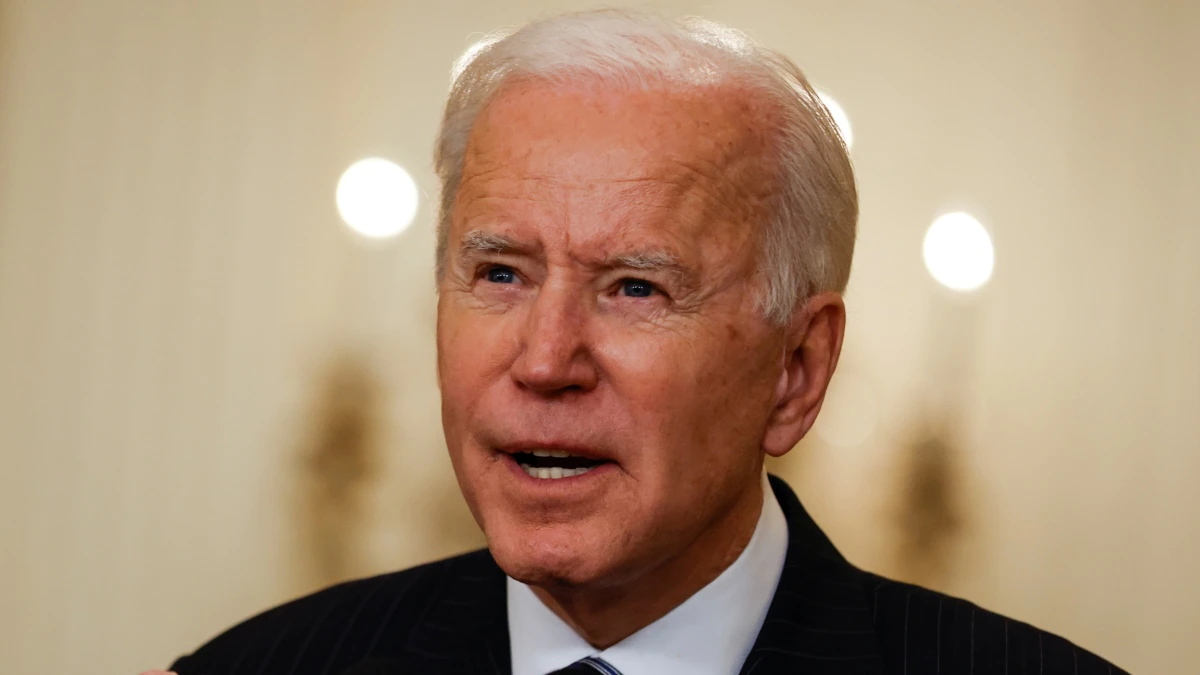
U.S. President Joe Biden has invited the leaders of China and Russia to a climate summit he is hosting in April, despite deep differences with the two countries on a host of other issues.
Presidents Xi Jinping of China and Vladimir Putin of Russia are among 40 world leaders invited to the two-day virtual summit, meant to highlight the United States’ renewed commitment to stemming climate change, the White House said.
The start of the summit on April 22 coincides with Earth Day and will “underscore the urgency — and the economic benefits — of stronger climate action,” the White House said.
The gathering is expected to build towards the United Nations Climate Change Conference (COP26) this November in Glasgow, Scotland.
Biden rejoined the Paris climate agreement on his first day in the White House, reversing former President Donald Trump’s exit from the landmark accord.
The White House has said that climate change is one area where it may be possible to cooperate with China and Russia, even as ties are strained over many other issues.
The United States is the world’s largest economy and second-largest emitter of carbon dioxide after China.
With reporting by AFP, AP, and Reuters
This post was originally published on Radio Free.
-

KALININGRAD, Russia — A Russian woman serving a prison sentence on high treason charges has started a hunger strike to protest against being put in solitary confinement for complaining about beatings, her lawyer says.
Antonina Zimina’s lawyer told RFE/RL on March 26 that her client has been on hunger strike for four days in a detention center in Kaliningrad, the capital of Russia’s far western exclave of the same name.
In late December 2020, Zimina and her husband, Konstantin Antonets, were found guilty of spying for Latvia.
Antonets was handed a 12 1/2 year prison sentence. The couple has denied any wrongdoing ever since they were first arrested in July 2018.
Zimina’s lawyer, Maria Bontsler, said she was sent to seven days of solitary confinement on March 22 for “covering the observation hole on the door of her cell from inside and refusing to sign a registry of cleaning shifts,” a routine procedure for inmates who are required to clean the premises.
Zimina covered the observation hole while she was changing her clothes and refused to sign the registry because a guard who beat her in the past brought it for signing, according to Bontsler.
The lawyer added that the real reason behind Zimina’s placement in solitary confinement is most likely the complaints she voiced to officials of the Federal Penitentiary Service (FSIN) last week about her beatings by guards.
“The next day, she was called to the detention center’s operative department and instructed to sign documents retracting her statements. Now they are threatening to sue her for libel,” Bontsler said.
Zimina’s father, Konstantin Zimin, told RFE/RL that he was not allowed to see his daughter when he came to the detention center on March 26.
This post was originally published on Radio Free.
-
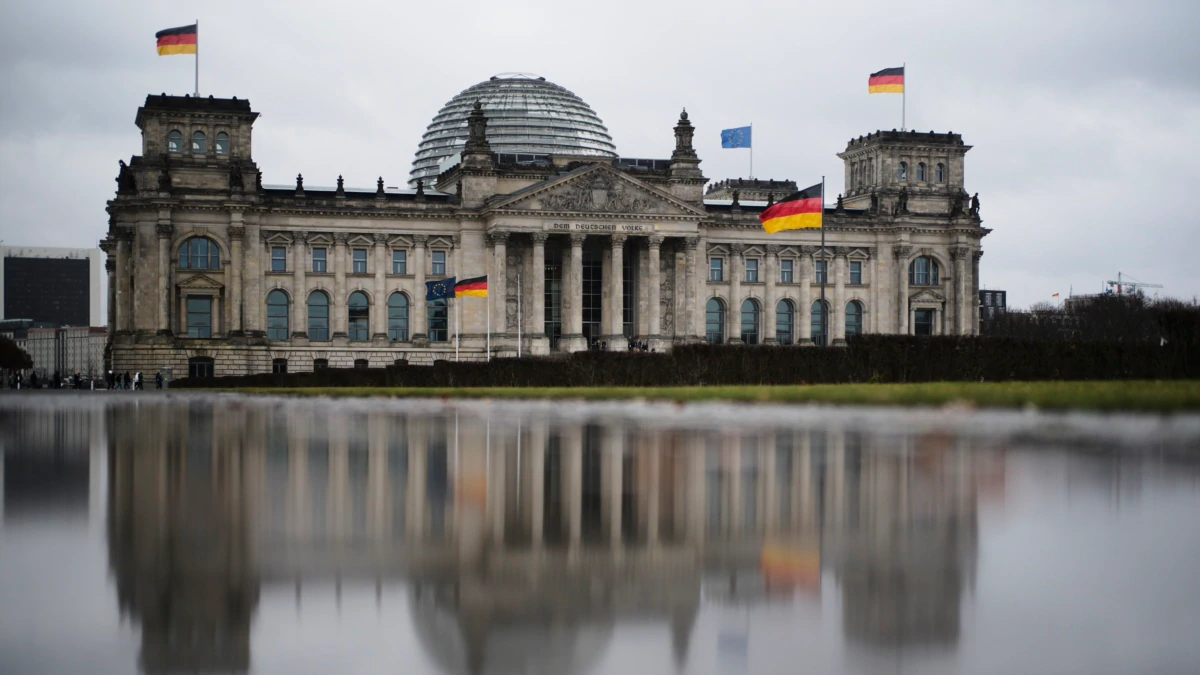
Suspected Russian state-backed hackers with a history of running disinformation campaigns against NATO have targeted dozens of German lawmakers, German media reported on March 26.
The hackers used spear-phishing e-mails to target the private e-mail accounts of members of the German parliament and regional state assemblies, in the latest suspected Russian-backed effort against lawmakers in the country.
Public broadcaster WDR and news website Der Spiegel reported that the attacks occurred in recent days and were noticed by the BfV domestic intelligence agency and the country’s information security agency.
It was unclear what, if any data, was stolen. WDR reported at least some e-mail accounts were compromised. Der Spiegel reported at least seven members of parliament were targeted and 31 lawmakers in state assemblies.
German security officials believe the cyberattack was carried out by a group known as Ghostwriter, long suspected of ties to Russia’s GRU military intelligence agency.
WDR said officials are now warning of possible disinformation campaigns stemming from the cyberattack.
According to the U.S. cybersecurity firm FireEye, since at least 2017 Ghostwriter has run information operations as part of a Russian influence campaign. The operations have primarily targeted the Baltic states and Poland, with a focus on producing disinformation about NATO.
The Ghostwriter campaign has “leveraged website compromises or spoofed e-mail accounts to disseminate fabricated content, including falsified news articles, quotes, correspondence, and other documents designed to appear as coming from military officials and political figures in the target countries,” FireEye said in an analysis last year.
For example, Ghostwriter is believed to be behind spreading fake news in 2018 about German soldiers participating in the NATO mission in Lithuania desecrating a Jewish graveyard and running over a child with a tank.
In 2015, suspected Russian hackers tied to the GRU carried out a massive cyberattack on the German parliament, disrupting IT systems and stealing troves of data. The e-mail accounts of several members of parliament, including in Chancellor Angela Merkel’s office, were affected.
With reporting by Der Spiegel and WDR
This post was originally published on Radio Free.
-
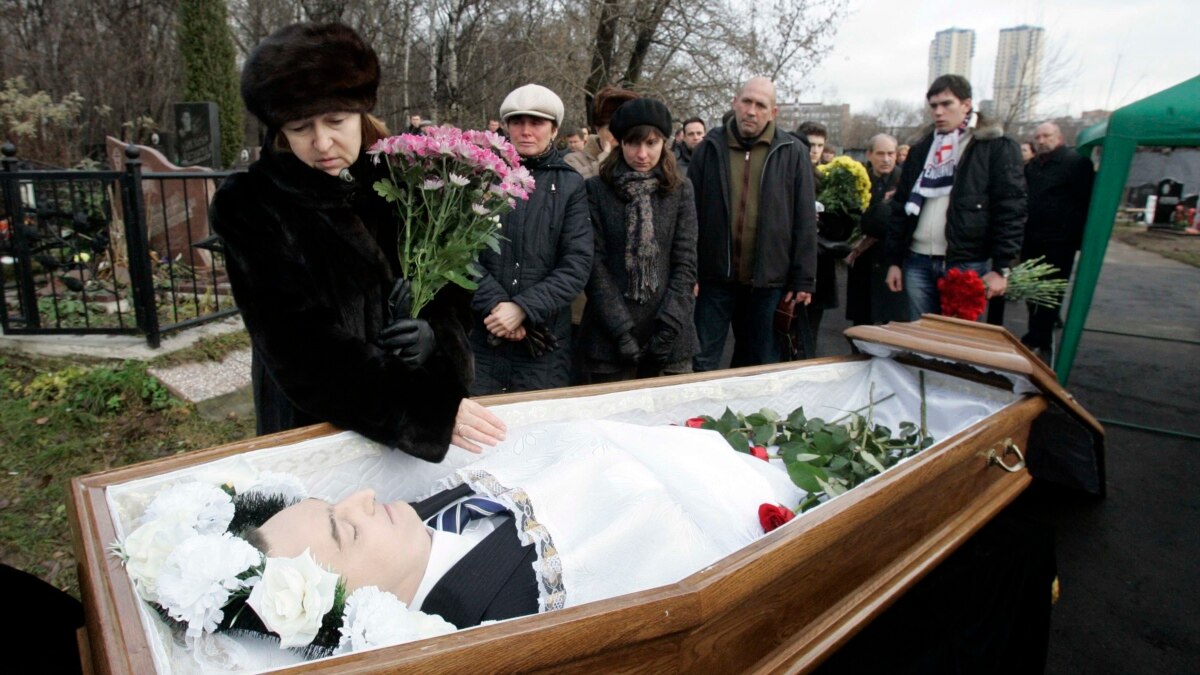
“Did they want to kill him?” wondered Jamison Firestone in a November 2009 interview with RFE/RL’s Russian Service. “I don’t know.”
Firestone was the managing partner of Firestone Duncan, a Moscow law firm that hired Sergei Magnitsky to look into suspicions of massive tax fraud and theft in the takeover of companies belonging to the investment firm Hermitage Capital Management. Magnitsky died after 358 days in a Moscow pretrial-remand prison on November 16, 2009. He had not been charged with any crime.
“Magnitsky showed that a group of Interior Ministry officers were guilty of embezzling from the state budget the sum of $230 million,” Firestone said. “And these officers were among the group that arrested him. They did this in order to silence him. After his arrest, they had to justify their actions and create some accusations. It took them 10 months to fabricate their nonsensical story,” he said. “Clearly, the investigators were trying to force him to confess to things that were not true.”
‘A Deliberate Strategy’
Magnitsky, who was 37, had repeatedly said he was being denied medical treatment, and rights activists said his mistreatment amounted to torture.
More than a decade later, supporters of imprisoned opposition leader Aleksei Navalny are issuing increasingly alarming warnings that Navalny’s health has deteriorated in the weeks since his arrest upon returning to Russia from Germany in January and particularly since he was moved to a prison in the Vladimir region earlier this month.
Navalny lawyer Vadim Kobzev accused the authorities of “a deliberate strategy…to undermine his health,” while Navalny’s wife, Yulia Navalnaya, said her husband’s treatment was “personal revenge” for his political activity.
Navalny had been in Germany since August 2020, when he was flown there for treatment following a near-fatal poisoning with a Novichok-type nerve agent on a trip to Siberia. He has blamed Russian President Vladimir Putin for the incident, which open-source investigators have argued was carried out by a team of Federal Security Service (FSB) operatives. In December, Navalny claimed he had duped one of the alleged FSB operatives, Konstantin Kudryavtsev, into confessing to participating in the poisoning during a 49-minute telephone conversation in which Navalny posed as a Kremlin official.
Navalny has complained of severe back pain and a loss of sensation in his right leg that has made it “practically nonfunctional.” He did not appear for a scheduled meeting with his lawyers on March 24. The following day, Russian prison officials issued a terse statement saying that Navalny’s health was “stable” and “satisfactory.”
After being allowed to see him, his lawyers disputed that claim, with one saying his condition was “extremely unfavorable.”
In two recent letters to the authorities that were made public on March 25, Navalny charged that his jailers were torturing him through sleep deprivation and withholding medical treatment in a deliberate effort to harm his health.
“This is exact deja-vu from the Magnitsky case,” wrote Hermitage Capital CEO and head of the Global Magnitsky Justice Campaign Bill Browder in a post on Twitter on March 25. “The medical neglect that Putin is inflicting on Alexei Navalny is deliberate and Putin wants the world to know he’s doing it.”
‘A Torture Chamber’
Speaking to RFE/RL in 2009, just a month before Magnitsky’s death, Browder noted the prisoner’s deteriorating health. “He has been in custody for 11 months now,” he said. “He has not been granted one single visit with his family. He has lost 18 kilograms.”
“Sergei Magnitsky was held in the pretrial jail under inhuman conditions,” Firestone said in the interview conducted shortly after Magnitsky’s death. “He had serious health problems, including a serious digestive illness. The prison knew perfectly well about this because at first they gave him medical help. Later the authorities began pressuring him to force him to give false testimony. So they stopped giving him medical treatment. They took away his medications. They refused to allow him to consult with his doctor. Magnitsky complained about this many times. During this time, he lost more than 20 kilograms.”
Magnitsky filed many complaints about his treatment, Firestone added. “Just the list of his complaints about this takes up four pages,” he said.
Although Magnitsky was transferred to Moscow’s Matrosskaya Tishina jail on the day of his death, he spent most of his imprisonment in the notorious Cell Block No. 2 of the Butyrka remand prison. Roman Popkov was an activist with the illegal radical leftist National Bolshevik movement who spent two years in the same building at Butyrka and was released the year before Magnitsky’s death.
“As I read his diaries, I understood that nothing has changed in the last year,” he told RFE/RL in December 2009. “I could see this cell block remained a torture chamber.”
“They throw people in there with a single aim — to convince them deep down of their complete helplessness in the face of the system,” Popkov added. “The police investigations unit sends them to Butyrka and the Butyrka administration sends them into those basements so that they will be more agreeable with the investigators and the court.”
According to The New York Times, at 11 a.m. on November 16, Butyrka prison doctor Larisa Litvinova ordered Magnitsky’s transfer to Matrosskaya Tishina because his health situation had become urgent. After six hours, an ambulance arrived for him. He arrived at 6:30 p.m. A doctor prescribed him a painkiller, ordered a psychiatric evaluation, and left. Staff found him unconscious on his cell floor at 9:20 p.m. and he was pronounced dead half an hour later.
The official cause of death was given as toxic shock and heart failure brought on by pancreatitis.
In an open letter to the Russian government in March 2010, human rights activist and then-head of the Moscow Helsinki Group Lyudmila Alekseyeva wrote that Magnitsky’s death “resulted from willfully cruel treatment.”
“Torture was used by officers of the Interior Ministry as a method to pressure Mr. Sergei Magnitsky in the course of the investigation of a criminal case,” Alekseyeva wrote. “Mr. Sergei Magnitsky died from torture that was willfully inflicted on him.”
An initial investigation by the Kremlin’s advisory Human Rights Council concluded that Magnitsky had been severely beaten and denied treatment.
Hitting Rights Abusers ‘Where It Hurts Most’
After years of international campaigning by Browder and others, the United States in 2012 passed the original Magnitsky Act that allowed Washington to impose targeted sanctions on individuals in Russia accused of human rights violations. In 2015, the United States adopted the Global Magnitsky Act that extended the same penalties to alleged rights abusers in other countries.
The anti-corruption NGO Global Witness has called the U.S. Magnitsky laws “an important tool” in the fight against abuses. “It’s a successful example of concrete action being taken against the corrupt and the worst human rights abusers, hitting them where it hurts most — in their pocket,” Global Witness wrote in December 2019.
Over the next few years, Canada, the United Kingdom, the European Union, and others adopted similar legislation. The EU’s European Magnitsky Act was adopted in December 2020.
Taken together, the laws “fundamentally changed the role of targeted financial measures in the global fight against human rights abuses and corruption,” Atlantic Council senior fellow Hagar Hajjar Chemali wrote after the EU adopted the measure.
“The EU has said it would impose its first round of sanctions under this law at the beginning of 2021 and it is expected that Russian targets involved not only in the death of Sergei Magnitsky but also those tied to the recent attempted murder of key Russian opposition leader Alexei Navalny will be included,” Chemali wrote. “Navalny has encouraged the EU to target Russian oligarchs and those close to Russian President Vladimir Putin, in particular because of the assets and estates they have in Europe.”
On March 24, Browder posted on Twitter: “Alexei Navalny says health has sharply deteriorated in jail. This is how the hell that Putin has in store for him begins. I’ve seen it before with Sergei Magnitsky and its horrific. We must be ready to sanction a lot more Putin regime people.”
After the United Kingdom imposed Magnitsky Act sanctions on 25 Russians and 20 Saudis allegedly involved in laundering “blood money” in July 2020, British Foreign Secretary Dominic Raab lauded the new diplomatic tool.
“I think it’s absolutely right, particularly as a tool of foreign policy, that we subject the individuals responsible for…abuses — whether it’s torture, extrajudicial killing, or whatever it may be — to asset freezes and visa bans,” Raab told Reuters at the time. “I think it’s right as a statement of our international posture to say that we don’t want people responsible for these appalling crimes, with blood on their hands, coming to this country, doing their Christmas shopping in Knightsbridge or the King’s Road or trying to invest in British banks or British property.”
On March 26, Kremlin spokesman Dmitry Peskov dismissed most of the parallels between the Magnitsky case and Navalny’s. He noted, however, that Magnitsky was posthumously convicted of large-scale tax evasion in July 2013, in what observers believe was the first-ever posthumous trial in Russia’s modern history.
“We don’t see any parallels,” Peskov said, “apart from the fact that unfortunately, the deceased Magnitsky was convicted and sentenced. Navalny is also convicted and sentenced.”
Navalny has been convicted at two trials on financial-crimes charges that he and supporters contend were fabricated to blunt his challenge to Putin. They also contend that the parole-violation claim that resulted in his current prison term is absurd and unfounded.
This post was originally published on Radio Free.
-

Russian help lines have recorded a surge in domestic violence during the year of COVID-19 restrictions. Meanwhile, a leading organization dealing with the issue is being evicted from its premises after being declared a “foreign agent” by the authorities, who say its calls for government agencies to help protect victims constitute “political activity.”
This post was originally published on Radio Free.
-
While meeting with NATO Secretary-General Jens Stoltenberg in Brussels on Tuesday, Secretary of State Antony Blinken reiterated the US’s opposition to the Nord Stream 2 pipeline that will connect Russia to Germany and warned Berlin about possible sanctions over the project.
“President Biden has been very clear in saying that he believes the pipeline is a bad idea; it’s bad for Europe, bad for the United States,” Blinken said. “Ultimately, it’s in contradiction to the EU’s own energy security goals. It has the potential to undermine the interests of Ukraine, Poland, a number of other close partners or allies.”
The post Blinken Threatens Germany With Sanctions appeared first on PopularResistance.Org.
This post was originally published on PopularResistance.Org.
-

ST. PETERSBURG, Russia — A university professor in Russia’s second city of St. Petersburg is under investigation for publicly denying the Holocaust.
The Leningrad regional prosecutor’s office said in a statement on March 25 that the probe was launched after preliminary investigations revealed a lecturer at a webinar for teachers on January 21 stated that the Holocaust during the World War II was “a myth” and “fiction.”
The statement does not identify the professor, but the chief editor of Ekho Moskvy radio in St. Petersburg, Valery Nechai, said earlier in January that the webinar in question was held by professor Vladimir Matveyev of the St. Petersburg State University of Economy and the Russian Academy of National Economy and Public Administration.
Nechai, referring to video taken from the webinar by correspondents of the online media outlet Novye Koltushi, said at the time that Matveyev stated that the number of Jews killed during the war was “exaggerated,” making a conclusion that the “genocide of Jews” cannot be called a Holocaust.
The lecture’s aim was to prepare teachers for lessons on the history of the Holocaust and the Red Army’s liberation of prisoners at the Auschwitz concentration camp in 1945.
Matveyev was fired from the universities after the scandal erupted in January and is being investigated under a 2014 law against rehabilitating Nazism. He faces up to five years in prison if found guilty.
This post was originally published on Radio Free.
-
This post was originally published on Radio Free.
-
This post was originally published on Radio Free.
-
To receive Steve Gutterman’s Week In Russia via e-mail every Friday, subscribe by clicking here. We’ve updated the format, so don’t be surprised if it looks slightly different when it lands in your in-box. And please check your spam folder if you didn’t receive it. If you have thoughts or feedback, you can reach us directly at newsletters@rferl.org.
The peculiarities of Putin’s propaganda were in the spotlight as a Siberian sojourn in sheepskin is captured on camera, while his alleged COVID-19 vaccination is not. Also unseen: imprisoned Kremlin foe Aleksei Navalny, whose lawyers raised the alarm about his treatment, saying he is in severe pain and accusing the authorities of a “deliberate campaign” to undermine his health.
And as the State Duma passed legislation formalizing Putin’s option of seeking two more terms as president — a change that analysts say has emboldened already powerful security agencies and police — new RFE/RL reports reveal further evidence of far-reaching ties between Russian law enforcement and the criminals it’s supposed to be catching.
Here are some of the key developments in Russia over the past week and some of the takeaways going forward.
Killer Coda
In the wake of an indirect but acrimonious exchange with U.S. President Joe Biden, Putin traveled to Siberia for a weekend in the woods with Defense Minister Sergei Shoigu, as he has done at least once in the past.
The cameras were rolling as Putin and Shoigu drove over snow-covered ground in a camouflaged all-terrain vehicle, drank tea from tin cups at a table in the open air, and checked out what one observer called the defense chief’s “bits of old wood collection.”
Some of Putin’s past action-man photo shoots have featured him bare-chested, but in this case more attention was paid to what he was wearing — a matching shearling coat and pants, lacking only a vest for a three-piece sheepskin suit — than to what he wasn’t.
Putin’s taiga time-out had apparently been planned earlier: He mentioned it when he challenged Biden to an “open discussion” — a debate, that is — saying that the weekend would be no good but that Friday or Monday would work. Biden’s response: “I’m sure we’ll talk at some point.”
As a propaganda exercise, it’s hard to imagine that Putin’s weekend activities could help move the needle much on his popularity ratings or hand Russian more confidence about their personal finances.
Propaganda Fail?
For example, such displays seem unlikely to affect the views of the 57 percent of Russian adults under 25, or the 51 percent from 25 to 40, who have decided they don’t want him to president after his current term ends in 2024, according to a survey by independent polling agency Levada Center.
But the Kremlin may have seen it as a way to show audiences at home and abroad that Putin has priorities — namely, his own country — other than how to respond after Biden was asked whether he thought the Russian president was a killer and answered, “Mm-hmm, I do.”
Later in the week, Putin missed what many observers agreed was a chance to make a sizable impact with a brief on-camera appearance: More than seven months after he announced that the first of Russia’s three coronavirus vaccines was approved for use, he was inoculated against COVID-19 on March 23, according to the Kremlin – but not on camera.
Given the trouble his government has had getting Russian citizens behind the idea that they should be vaccinated, and ensuring there are doses on hand when they do, refraining from getting the shot in public seemed hard to explain. It sparked speculation about his motives and whether he was vaccinated at all.
Russia has aggressively marketed the vaccine abroad, signaling even with its name — a nod to the satellite that stunned the West and heated up the U.S.-Soviet space race in 1957 — that the Kremlin sees distribution of vaccines as a competition.
But less than 5 percent of Russian adults have received both doses of a two-shot vaccine. In late December, a poll conducted by the Levada Center found that 58 percent of Russians were not prepared to be vaccinated with Sputnik V, which Putin announced on August 11 had received regulatory approval — the first in the world.
Russia has recorded nearly 4.5 million coronavirus cases since the pandemic began in early 2020 — fourth in the world after the United States, Brazil, and India, which have much bigger populations.
Distractions
Its official death toll reached 96,612 on March 25, but state mortality statistics indicate that the real number of coronavirus-related deaths is more than 200,000, and some researchers suspect it is still higher.
In any case, Putin’s appearances and nonappearances may have served to draw attention away from far more momentous developments — and that may have been the point, at least in part, as it often is.
One such development was a technicality: The State Duma, Russia’s lower house of parliament, passed a bill that will align electoral legislation with a change that was inserted into the constitution last year, after a choreographed campaign and a controversial nationwide vote, enabling Putin to seek two more six-year terms as president, in 2024 and 2030.
When the constitutional amendments were in the works, heading for certain adoption, political analysts and rights activists predicted that one result would be to embolden law enforcement and security agencies, such as the Federal Security Service (FSB).
At the time, Georgy Satarov, a Moscow think-tank head and former aide to Putin’s predecessor, Boris Yeltsin, said that the changes figuratively sounded the death knell for the constitution, and that “when the constitution ceases to exist, one thing remains: power.”
An array of developments seems to have proved those predictions accurate. Some of them are connected to Navalny, Putin’s most prominent foe, who was poisoned with a powerful nerve agent in Siberia on August 20, less than two months after the constitutional amendments entered into force.
Navalny was flown to Germany for treatment and was arrested upon his return to Russia on January 17. His jailing, along with anger at Putin and his government over a range of issues, sparked nationwide protests later that month that were the biggest in years — and were met with one of the harshest police crackdowns in years.
‘Torture’
On February 2, Navalny was handed a 2 1/2-year prison sentence on a parole-violation claim he calls absurd, stemming from a conviction on financial-crimes charges he contends were fabricated. And on March 25, lawyers who visited him in prison after several delays said that he was in “extremely unfavorable” condition, with severe back pain and problems that made his right leg “practically nonfunctional.”
Navalny had been complaining of sharp back pain for the past month and was denied treatment, lawyer Vadim Kobzev tweeted, accusing his jailers of pursuing “a deliberate strategy to harm his health.” He asserted that they were “essentially subjecting him to torture by lack of sleep” and were giving him two ibuprofen tablets daily for the pain — treatment he said was “obvious mockery.”
The Russian prison service, in what came across for many as something far closer to trolling than a reliable medical assessment, said that Navalny’s condition was “satisfactory.”
The concerns about Navalny’s health and treatment will draw comparisons with the fatal ordeal suffered by whistle-blower Sergei Magnitsky, who died in Moscow’s Matrosskaya Tishina jail in December 2009 after being denied medical treatment and subjected to abuse that he and rights activists said amounted to torture.
A 2012 U.S. law that enables Washington to impose sanctions on Russians deemed to have committed human rights abuses is called the Magnitsky Act, and other Western countries have passed similar legislation. Earlier in March, under different legislation, the United States and the European Union imposed sanctions on senior Russian officials — including the FSB director, the prosecutor-general, and the prison service chief — over the poisoning and jailing of Navalny.
In an Instagram post in which she said that “everyone who knows Aleksei knows that he would never complain until the last minute,” Navalny’s wife, Yulia Navalnaya, wrote that his back problems began a month ago, when he was being held at Matrosskaya Tishina, and had worsened since his transfer to a prison in Pokrov, east of Moscow.
Navalny blames Putin for his near-fatal poisoning and, along with open-source investigative outfit Bellingcat and its media partners, has produced detailed evidence — including a phone call in which an operative appeared to admit involvement — indicating that it was carried out by the FSB.
In Cahoots
While the FSB, police, prosecutors, and other law enforcement agencies may be feeling increasingly emboldened, their outsize clout is nothing new: It’s been a phenomenon since Putin, a longtime Soviet KGB officer who head the FSB for a year in 1998-99, came to power months later.
In 1999, before Yeltsin stepped down on New Year’s Eve and made him acting president, Putin pledged to make Russia into a “dictatorship of law.” Kremlin critics say what has emerged instead is a country in which law enforcement and organized crime are deeply and seemingly inextricably intertwined.
Two recent RFE/RL reports have added to the evidence of those ties, which span a broad swath of economy sectors and have withstood several campaigns with the stated goal of curbing such corruption.
One describes how a forest ranger at a nature reserve near Lake Baikal helped arrest five suspected poachers — and found himself facing criminal charges for “exceeding his authority,” a turn of events activists say may have resulted from friendly ties between poachers and prosecutors, police, and local politicians.
The other is a detailed and revealing report grounded in a far-reaching investigation that captures the scale and scope of the theft of oil from pipelines in Russia and the role that law enforcement officers play in it.
‘Emblematic’
On a smaller scale, there’s the article that author and analyst Mark Galeotti, an expert on the Russian security agencies, posted along with a seemingly rhetorical question: “How much of Putin’s Russia is encapsulated in this story?”
Assailants abducted a retired FSB general and tortured him until he led them to his home outside Moscow and dug up seven plastic containers in the yard that held about $5 million in a mix of currencies, the tabloid Moskovsky Komsomlets reported on March 25. Two suspects were caught, convicted of kidnapping and extortion, and sentenced to 10 years in prison apiece.
Meanwhile, with the testimony about containers stuffed with cash, the trial “attracted the attention of prosecutors” to the retired FSB officer’s undeclared wealth, which far exceeded the possibilities provided by his state salary and pension. In the end, the authorities seized a safe-deposit box holding $1.1 million and 5 million rubles ($66,000) as well as a house near Moscow valued at 36 million rubles ($475,000).
According to the business daily Kommersant, the retired general argued that his assailants had not taken any money from him. And the defendants claimed their confessions were extracted through torture.
This post was originally published on Radio Free.
-
The new Cold War has escalated over the past week as U.S. attempts to dominate both China and Russia backfired in embarrassing fashion for the Biden administration. Behind The Headlines’ Dan Cohen is joined by “Silk and Steel” podcast host Carl Zha to discuss the diplomatic fiasco, how U.S. intelligence and media cornered Biden into denouncing Russia, and the Quad Alliance’s political contradictions.
The post US Escalates New Cold War As Diplomatic Gloves Come Off appeared first on PopularResistance.Org.
This post was originally published on PopularResistance.Org.
-
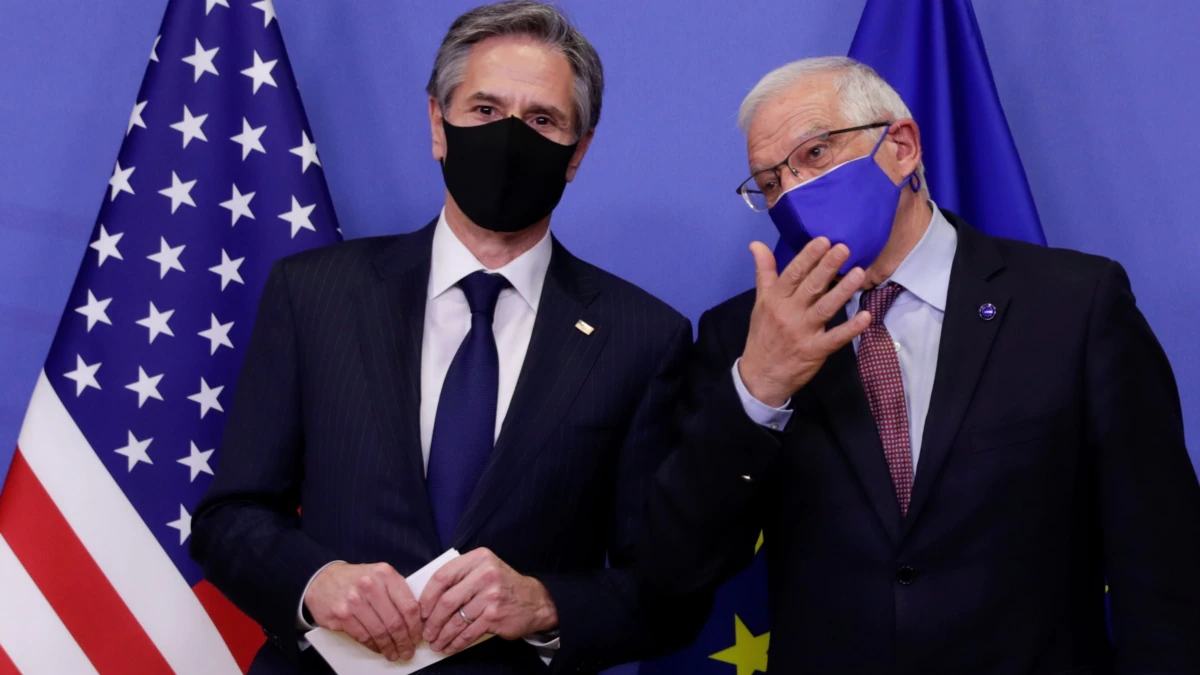
The U.S. and EU top diplomats say they have agreed to coordinate their response to Moscow’s “challenging” behavior such as its “ongoing aggression” against Ukraine and Georgia, as well as the “dwindling respect” in Russia for human rights and the rule of law.
In a joint statement issued on March 24 following talks in Brussels, U.S. Secretary of State Antony Blinken and the EU high representative for foreign affairs, Josep Borrell, said they were determined to address, in a coordinated manner, Russia’s “hybrid threats, such as disinformation; interference in electoral processes; malicious cyber activities; and military posturing.”
The two also “decided to coordinate their response to the shrinking space in Russia for independent political voices, civil society, and media freedom.”
Blinken and Borrell agreed to relaunch a bilateral dialogue on China, acknowledging that relations with Beijing comprise “elements of cooperation, competition, and systemic rivalry.”
Among other issues the two officials discussed were Iran’s nuclear program, reforms across the Western Balkans region, the global climate crisis, and the coronavirus pandemic.
Blinken was in the Belgian capital to attend a two-day NATO foreign ministers’ meeting and hold talks with EU leaders as part of U.S. President Joe Biden’s efforts to repair transatlantic ties after his predecessor, former President Donald Trump, pursued an “America first” policy that tended to treat traditional allies more as rivals than partners.
This post was originally published on Radio Free.
-
US President Joe Biden’s attempted slander against Russian leader Vladimir Putin – calling him a “killer” – was not only disgraceful. It was also very stupid.
The post Putin’s Killer Response first appeared on Dissident Voice.Such foul-mouth conduct betrays the American leader as having no class whatsoever. It demeans oneself and it tarnishes the supposed prestige of his office as the world’s self-declared most powerful man.
But the verbal jab also set up Biden for a swift body slam by the judo master Putin.
The Russian president gave a calm and magnanimous response to the American counterpart’s comment in an ABC News interview last week in which Biden agreed to a (ludicrous) characterization of Putin as a “killer”. In reply, Putin said he sincerely wished Biden “good health”.
Such a charitable response not only highlights the American president’s crudeness and mean spirit. It gives the Russian leader the moral high ground. The whole world, including many Americans, were able to compare the two men and see right away which one has the superior calibre of culture and intellect.
Secondly, without resorting to vulgar vocabulary, Putin was able to turn the tables on Biden by exposing him and many of his predecessors as the real killers. By saying the remark was a form of projection and a case of looking in the mirror at oneself, Putin was able to review the entire sordid, genocidal history of the United States, including the destruction of native people and the dropping of atomic bombs on Japan. That vile legacy of mass violence and state terrorism includes Joe Biden who as a senator and former vice president has been instrumental in launching numerous criminal wars which have resulted in millions of people being killed and whole nations demolished. Just last month, too, Biden ordered deadly airstrikes on Syria – his first act of murder as president only four weeks after his inauguration. Biden accusing others of being a killer is grotesque.
© Sputnik / Natalia SeliverstovaBut it was Putin’s offer of a live and public videoconference with Biden that was perhaps what made his response such a winning slam.
Despite the slanderous jibe, Putin said he was immediately ready to discuss a range of issues with the US president, and that the conversation could be televised for the public. He proposed holding the discussion this week.
“Since Biden’s words were quite unprecedented, unprecedented formats can’t be excluded,” explained Kremlin spokesman Dmitry Peskov. “President Putin proposed to discuss the situation openly because it would be interesting for the people of both countries.”
Indeed interesting, to say the least. Now it turns out that Biden has rejected the offer of public debate with Putin, according to Russia’s foreign ministry.
Thus, the American president has made himself look feeble. He’s running scared. It’s one thing to act the tough guy in a controlled US media interview, but why not say your piece to Putin’s face? It shows that Biden is all bluster and blather, speaking out of order without any evidence to back up.
That’s because Biden’s defamation of the Russian president is baseless. It’s just the usual flimsy falsehoods spoken with the usual American arrogance and hypocrisy. Biden knows that if he was debating Putin in public the latter would destroy him verbally and intellectually. Putin’s command of history and facts – without the aid of a teleprompter – would make Biden look like the stupid thug he is.
© REUTERS / CARLOS BARRIAMoreover, in rejecting Putin’s challenge to hold a public discussion Biden brings unfavourable attention to his own bumbling image and growing questions over this president’s mental health. More people will be wondering if the 78-year-old man in the White House is really up for the job. This goes beyond his notorious habit of mangling words and “screwing up” – as Barack Obama once lamented about his former vice president.
Since becoming the 46th president, Biden’s public appearances and utterances have fueled more questions about the apparent deterioration in his cognitive health. He doesn’t take questions from reporters, seems to be avoiding press conferences, forgets names of his own cabinet members and last week lost his footing while boarding an aircraft.
The barnstorming Biden made a big mistake when he tried to bad-mouth Putin. In trying to spar with the Russian leader he ended up punching himself in the head by giving Putin the opportunity for a knock-out response.
• First published in Sputnik News
This post was originally published on Dissident Voice.
-
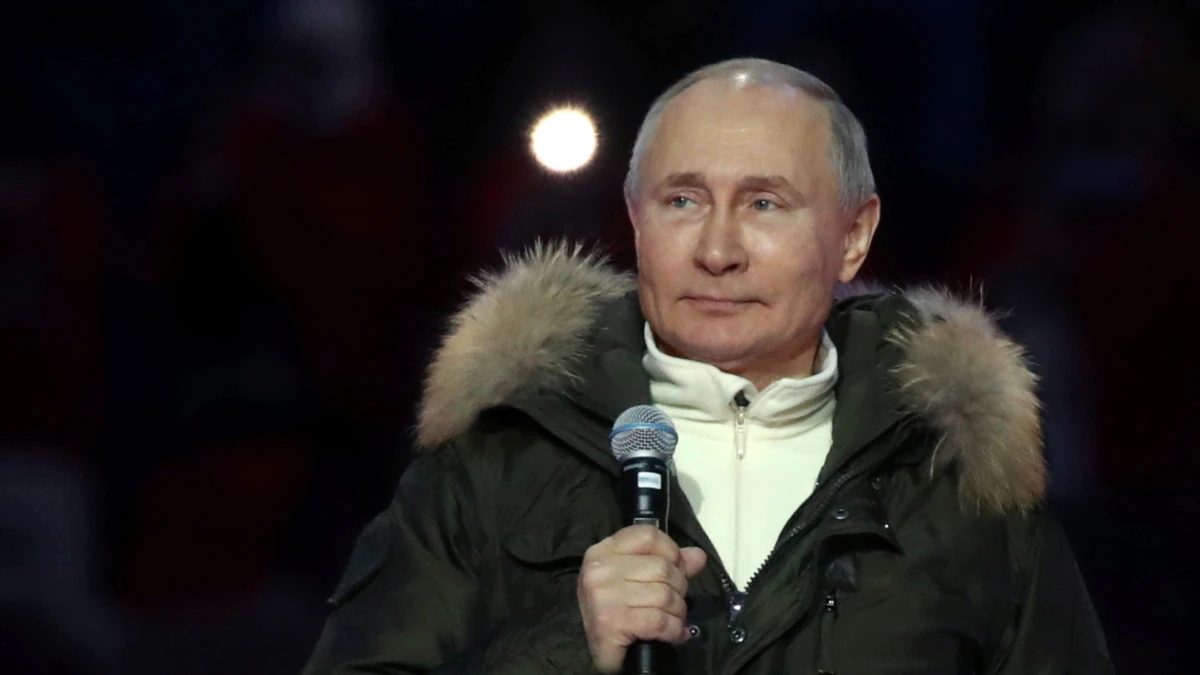
Russian President Vladimir Putin has been vaccinated against COVID-19 and is feeling well, RIA said on March 23 citing the Kremlin, as authorities seek to encourage hesitant Russians to get the shot.
The Kremlin said earlier on March 23 that it had deliberately decided not to reveal the name of the Russian-made vaccine which Putin chose to take.
Putin had been criticized for being slow to get vaccinated in a country where there is widespread hesitance over the vaccine.
So far, some 4.3 million people in Russia have received both doses of a two-shot vaccine, which is less than 5 percent of the country’s 146 million people, putting Russia behind many other countries in its rollout.
Russia has the world’s fourth-highest number of coronavirus infections at 4.4 million, and the seventh-highest death toll from COVID-19 at 94,231.
The country has developed three COVID-19 vaccines — Sputnik V by the Gamaleya National Center of Epidemiology and Microbiology in Moscow, EpiVacCorona, produced by the Vector Institute in Novosibirsk, and CoviVac, from the Chumakov Centre in St. Petersburg.
In August, Russia approved the world’s first COVID-19 vaccine, Sputnik V, prompting scientists around the world to question its safety and efficacy because it was registered before the results of Phase 3 studies were made available.
However, peer-reviewed, late-stage trial results published in The Lancet medical journal last month showed the two-dose regimen of Sputnik V was 91.6 percent effective against symptomatic COVID-19, about the same level as the leading Western-developed vaccines.
Still, a recent survey by the Levada Center, an independent polling agency, showed that the number of Russians hesitant to get the Sputnik V shot grew in February to 62 percent from 58 percent in December.
The EpiVacCorona and CoviVac vaccines also received regulatory approval before completing late-stage trials.
This post was originally published on Radio Free.
-
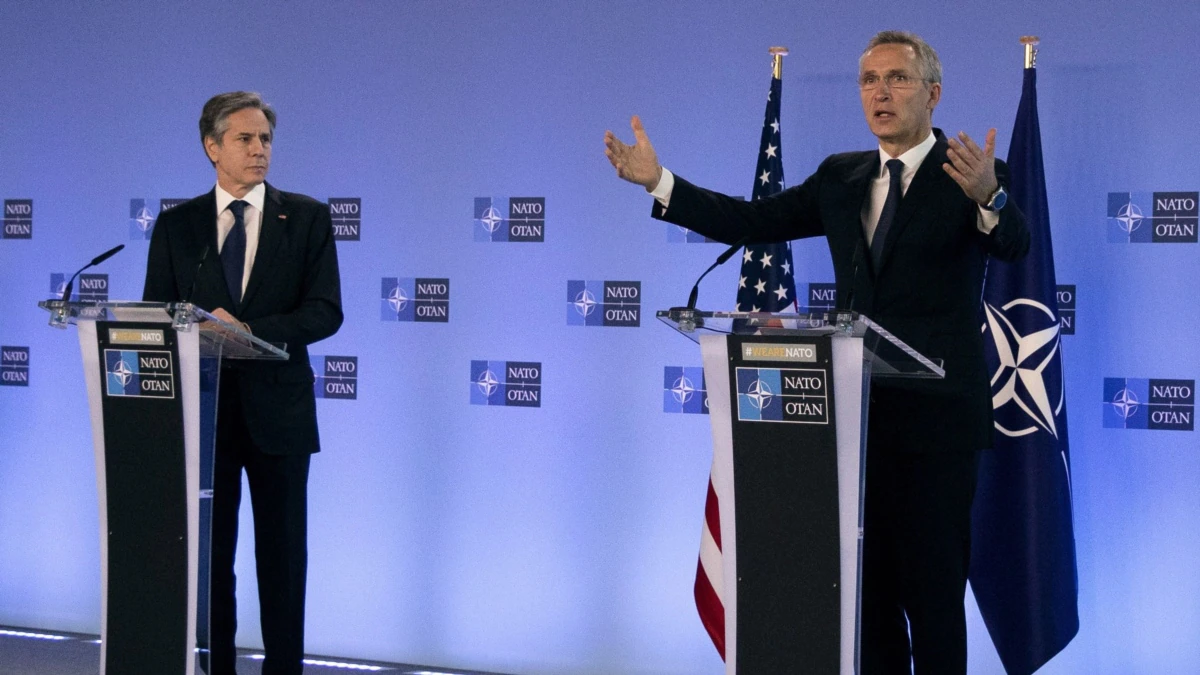
NATO foreign ministers have vowed that the Western alliance will continue to adapt in the face of “rising threats and systemic competition,” and underlined that “Russia’s aggressive actions constitute a threat to Euro-Atlantic security.”
“Assertive and authoritarian powers, and non-state actors, challenge the rules-based international order, including through hybrid and cyber threats, the malicious use of new technologies, as well as other asymmetric threats,” the ministers said in a joint statement issued on March 23 after a first day of talks in Brussels.
Earlier in the day, U.S. Secretary of State Antony Blinken, who is attending the two-day NATO gathering – the first face-to-face meeting of foreign ministers at the Western security alliance since 2019 — said China’s military rise and Russia’s attempts to destabilize the West were threats that required NATO to come together.
In their statement, the NATO ministers reaffirmed “the enduring transatlantic bond between Europe and North America, with NATO at its heart” — after four years of doubt and concern among some allies under the previous U.S. administration of President Donald Trump, who often criticized some allies for failing to pay their fair share of the defense burden.
The ministers also committed to Article 5 of NATO’s founding treaty, under which an attack against one ally shall be considered an attack against them all.
Noting that members of the 30-nation alliance “are making good progress on fairer trans-Atlantic burden sharing,” the NATO ministers welcomed “the efforts made by all Allies in Europe and North America that contribute to our indivisible security.”
On his first trip to Brussels, where he is also scheduled to hold talks with European Union leaders as part of U.S. President Joe Biden’s efforts to repair transatlantic ties, Blinken vowed Washington would work to rebuild and strengthen NATO.
“The United States wants to rebuild our partnerships, first and foremost with our NATO allies, we want to revitalize the alliance,” he told reporters as he met NATO Secretary-General Jens Stoltenberg.
French Foreign Minister Jean-Yves Le Drian welcomed Blinken’s statements, saying that NATO had “rediscovered” itself.
“There will be no European defense without NATO, and there will be no efficient and relevant NATO without Europeans,” he said at NATO headquarters.
With reporting by Reuters, dpa, and AP
This post was originally published on Radio Free.
-
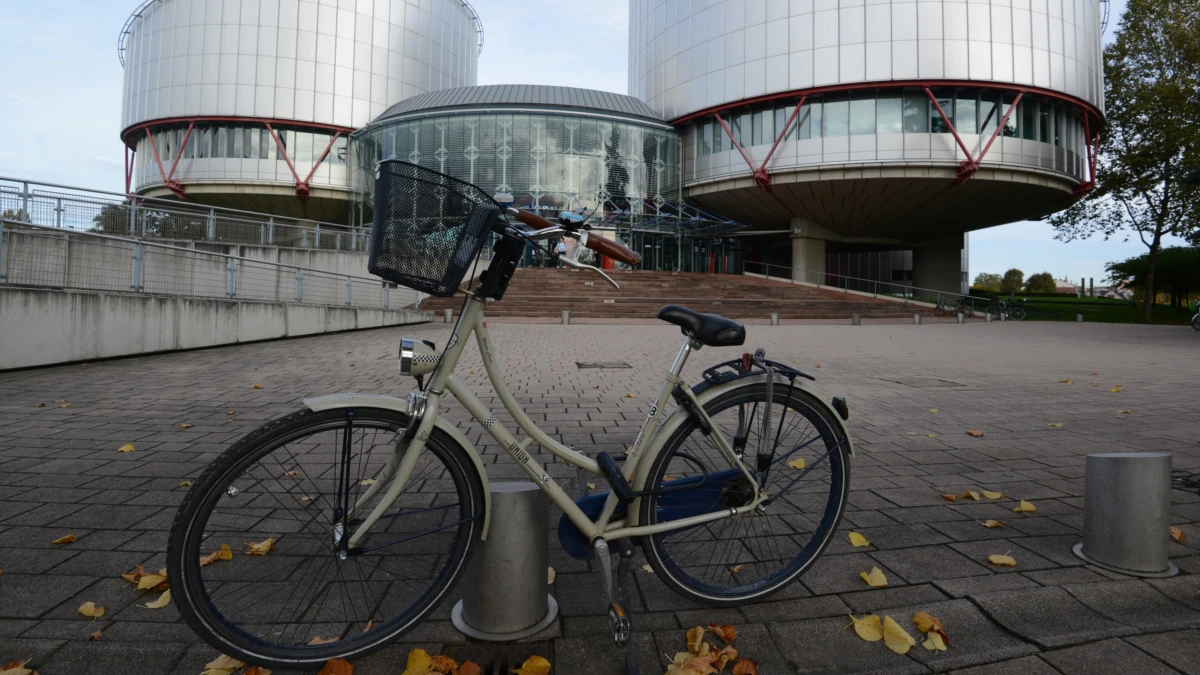
An employee of the Russian Consulate in Strasbourg is suspected of selling dozens of stolen bicycles, French media reports said on March 22.
According to the reports, a 40-year-old driver for the Russian diplomatic mission was detained for questioning on February 14 but released 24 hours later as police pursued the investigation.
When police wanted to question the suspect for a second time later in February, they were informed by the consulate that he had returned to Russia for “health reasons.”
Police launched the probe after an expensive electric bicycle belonging to the former deputy mayor of Strasbourg, Alain Fontanel, was stolen on a street near Strasbourg’s diplomatic quarter.
Fontanel turned to police after he saw his bike offered for sale on the Leboncoin website several days later.
Police contacted the seller who agreed to sell the bike at a site just next to the Russian consulate.
The man had a fake receipt of purchase with a Russian consulate stamp along with Fontanel’s bike identified by its serial number later, and three other bikes.
Police found out later that some 300 ads for high-quality bikes had been posted on the Leboncoin site since January 2020, representing a potential value of up to 100,000 euros ($120,000).
The investigation continues as prosecutors weigh whether to proceed with a trial even if the suspect remains out of reach.
Based on reporting by AFP and France Bleu
This post was originally published on Radio Free.
-

An employee of the Russian Consulate in Strasbourg is suspected of selling dozens of stolen bicycles, French media reports said on March 22.
According to the reports, a 40-year-old driver for the Russian diplomatic mission was detained for questioning on February 14 but released 24 hours later as police pursued the investigation.
When police wanted to question the suspect for a second time later in February, they were informed by the consulate that he had returned to Russia for “health reasons.”
Police launched the probe after an expensive electric bicycle belonging to the former deputy mayor of Strasbourg, Alain Fontanel, was stolen on a street near Strasbourg’s diplomatic quarter.
Fontanel turned to police after he saw his bike offered for sale on the Leboncoin website several days later.
Police contacted the seller who agreed to sell the bike at a site just next to the Russian consulate.
The man had a fake receipt of purchase with a Russian consulate stamp along with Fontanel’s bike identified by its serial number later, and three other bikes.
Police found out later that some 300 ads for high-quality bikes had been posted on the Leboncoin site since January 2020, representing a potential value of up to 100,000 euros ($120,000).
The investigation continues as prosecutors weigh whether to proceed with a trial even if the suspect remains out of reach.
Based on reporting by AFP and France Bleu
This post was originally published on Radio Free.
-
MOSCOW — A Moscow book fair has prompted accusations of censorship after it canceled an appearance by a debut author who is a top aide to jailed opposition politician Aleksei Navalny.
Kira Yarmysh, Navalny’s longtime spokeswoman and a prominent activist in her own right, was set to present her novel Incredible Incidents In Women’s Cell No. 3 at the Non/Fiction book festival, which will be held at an exhibition space near the Kremlin from March 24 to 28.
But the book’s publisher, Corpus, revealed that its parent company had given in to pressure by the event’s organizers to withdraw Yarmysh’s appearance from the event.
“It’s the typical argument,” Corpus chief editor Varvara Gornostayeva wrote in a Facebook post on March 23. “We need to preserve the book fair at any price, and an appearance by a opposition figure, and Aleksei Navalny’s spokesperson at that, places the fair’s existence under threat.”
Vitaly Kogtyev, a representative of the book fair, confirmed the decision to withdraw Yarmysh’s invitation in comments to Russian media, though he did not cite a reason. Non/Fiction did not immediately respond to a request for comment, but the event program published on its website includes no mention of Yarmysh or her book.
The controversial decision comes at a tense time for Russia’s opposition, and specifically Navalny and his regional network of campaign offices. The anti-corruption crusader incited a nationwide wave of protests in January that was brutally suppressed by police, and on February 2 he was sentenced to 2 1/2 years in prison over a parole violation charge he contends is absurd.
Since his return to Russia in mid-January after five months in Germany recovering from the effects of a nerve-agent poisoning he blames on President Vladimir Putin, Navalny’s movement has faced a targeted campaign against its activists and coordinators throughout Russia, some of whom are in custody or face criminal prosecution in connection with rallies.
Last week, Navalny’s award nomination for a series of investigative documentaries revealing evidence of corruption among the country’s top officials prompted a bitter conflict in Russia’s filmmaking community and led the Russian Guild of Film Critics to drop its prestigious cinema prize.
Yarmysh’s book, about six women who share stories while stuck in a jail cell, came out in the fall. Since February 2, she has been under house arrest pending trial on charges that she and nine other defendants created a risk to public health by promoting the January protests.
On March 18, a Moscow court extended her confinement by another three months, rendering her incapable of attending the scheduled book presentation even if it had gone ahead.
Yarmysh faces up to two years in prison if she’s convicted, and she is banned from communicating online. But in a post to her Facebook account, published by her aides, she issued a scathing assessment of the decision, calling it “base and cowardly” and a case of “direct collaboration with the authorities.”
“Censorship and self-censorship are among the worst traits of authoritarianism,” she wrote. “This can’t be explained with any virtuous intention to ‘save the book fair’…. On the contrary, silent tolerance of a division between permitted and prohibited writers is what will sooner or later destroy it.”
This post was originally published on Radio Free.
-
The team of jailed Russian opposition politician Aleksei Navalny is making a new push to free the anti-corruption campaigner with plans for the largest anti-Kremlin protest in Russia’s modern history.
In an announcement on Navalny’s website on March 23, the team said the date and site of the rally will be announced once at least 500,000 people express their willingness to participate.
The group also launched a special website to register those who would like to take part in the event as part of the push to get Navalny released from prison.
Leonid Volkov, the coordinator of Navalny’s network of teams, said that some 60,000 people had signed up to the event within hours of the website going operational.
“You know who our biggest enemy is? No, not Putin. Putin can’t stop the wonderful Russia of the future however much he wants to. Our main enemy is indifference, apathy and apoliticism,” Volkov said.
Navalny’s associates and supporters have been under pressure since the 44-year-old Kremlin critic was arrested on January 17 as he arrived from Germany where he had ben treated for a poisoning attack with what was determined by several European labs as a Novichok-like nerve agent.
Thousands rallied across Russia on January 23 and January 31 in protest at Navalny’s detention. Police violently put down the protests, arresting almost 10,000 people in the process.
On February 2, Navalny was found guilty of violating the terms of his suspended sentence relating to an embezzlement case that he has called politically motivated.
The court converted the sentence to 3 1/2 years in prison. Given credit for time already spent in detention, the court said the Kremlin critic would have to serve 2 years and 8 months behind bars.
The ruling sparked new mass protests across the country that were also violently dispersed by police.
Another 1,400 people were detained by police in Moscow, St. Petersburg, and other Russian cities on that day.
Navalny is currently being held in Correctional Colony No. 2, known as one of the toughest prisons in Russia.
The push also comes as Russians prepare to head to the polls in parliamentary elections in September where they hope to derail the ruling United Russia party’s stranglehold on power.
Navalny and his supporters have developed a “smart voting” system, which is aimed at undercutting United Russia candidates.
Under the system, voters can enter their address into a special app, which will then give them a list of the candidates deemed most likely to defeat their United Russia rivals regardless of their party affiliation.
This post was originally published on Radio Free.
-
Things that we now know are not actually true:
- Russia impacted the U.S. election results in 2016 or 2020.
- Russia hacked into U.S. election machines.
- The recent U.S. government report alleging election interference contained any evidence of anything.
- The report so much as alleged Russian involvement in the Biden-Ukraine-corruption story.
- Russia changed the GOP platform.
- Russia worked with WikiLeaks.
- Russia met with Michael Cohen in Prague.
- 17 U.S. agencies claimed Putin launched cyber-attacks in 2016.
- Russia hacked Vermont’s electricity.
- The pee and prostitutes story.
- Anyone has confirmed the allegation against Russia of placing bounties on heads in Afghanistan.
- The people of Crimea voting to re-join Russia is the worst threat to peace on earth in recent decades, in contrast to U.S. led wars that have killed and displaced millions but not disturbed the stable peaceful world order.
- Rejecting lies about Russia requires believing anything good about Russia or Donald Trump.
- Threatening or attacking a nation improves its respect for human rights.
- Risking nuclear war is justified by some greater good.
Things you can find in the U.S. media:
- President Joe Biden written about as a victim or an observer of his calling Vladimir Putin a killer.
- The falsehoods above are accepted truth and Russia is to blame for the U.S. mass shooter problem.
- Biden calling Putin a killer was a good thing, but Putin wishing Biden good health was a threat made from occupied Crimea.
- Noble democratic movements in Russia are represented and led by vicious xenophobe Aleksei Navalny (who in reality has little support in Russia but has posted a video in which he pretends to kill an immigrant).
- NATO is good for you.
- Wildly out of control military spending is needed to “deter Russia,” which spends 8 percent what the United States does on militarism.
This post was originally published on Dissident Voice.
-
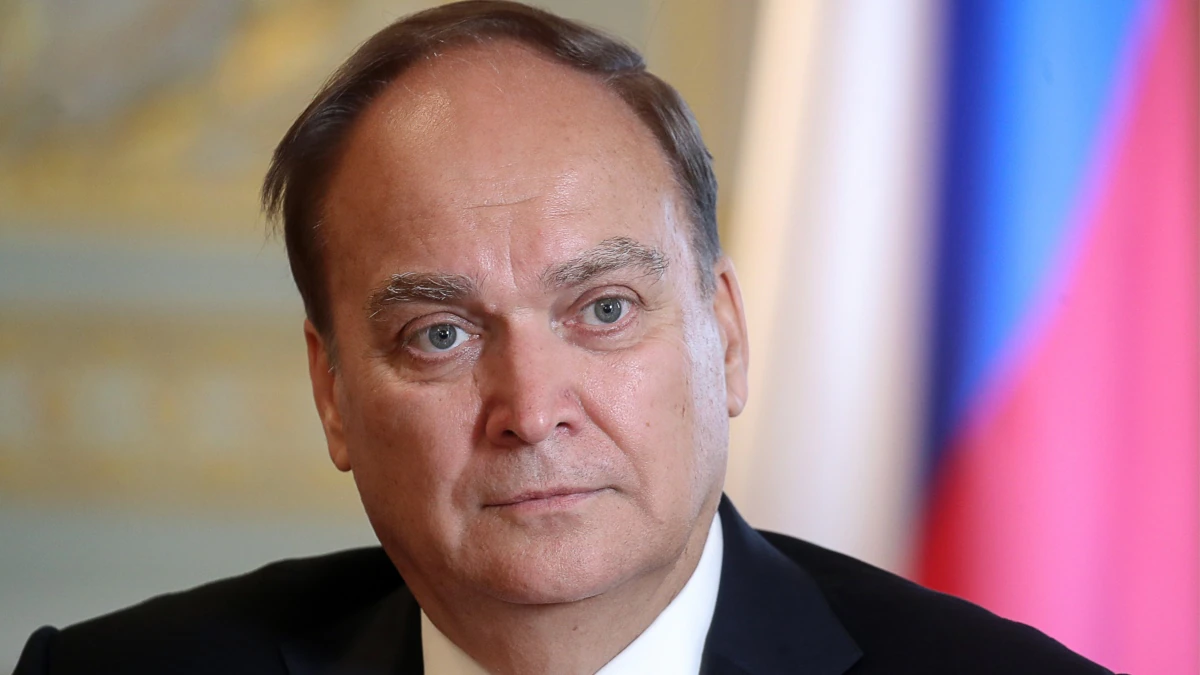
Russia’s ambassador to the United States returned to Moscow on March 21 following his recall for emergency consultations amid rising tensions with Washington after President Joe Biden said he believed his Russian counterpart Vladimir Putin was a “killer.”
Biden’s remark in a TV interview earlier in the week in turn prompted a terse quip from Vladimir Putin who wished the U.S. president “good health” and said that people tend to refer to others as they really see themselves.
The Biden interview came on the heels of the release of a report by the U.S. Office of the Director of National Intelligence that concluded Putin had “authorized, and a range of Russian government organizations conducted, influence operations aimed at denigrating President Biden’s candidacy and the Democratic Party, supporting former President [Donald] Trump, undermining public confidence in the electoral process and exacerbating sociopolitical divisions in the United States.”
The Kremlin immediately denied the findings of the report, saying they were “absolutely unfounded.”
Ambassador Anatoly Antonov landed at Moscow’s Sheremetyevo airport early on March 21, Russian news agencies reported, after he was recalled last week over the spat.
Before takeoff in New York he told agencies he would stay in Moscow “as along as needed” and that several meetings were scheduled.
“The Russian side has always stressed that we are interested in the development of Russian-American relations to the same extent as our American colleagues are,” he was quoted as saying by TASS.
Moscow, which rarely recalls ambassadors, last summoned its envoy in the United States in 1998 over a Western bombing campaign in Iraq.
In 2014, after the U.S. said Russia would face repercussions for the annexation of Crimea from Ukraine, Putin held back on recalling Moscow’s envoy, describing the measure as a “last resort.”
With reporting by AFP and TASS
This post was originally published on Radio Free.
-

Technical problems forced the launch of a Russian Soyuz rocket with 38 satellites on board to be postponed until March 22, the Russian space agency Roskosmos said.
The launch from Kazakhstan’s Baikonur Cosmodrome, originally scheduled to take place on March 20, was delayed after a surge in voltage was detected, space agency chief Dmitry Rogozin said.
“Having heard reports from the work managers, the State Commission decided to conduct the launch on the morning of March 22, 2021,” Roskosmos said later in a statement.
The rocket was due to place in orbit 38 satellites from 18 countries, including Japan, South Korea, Saudi Arabia, Canada, Germany, Italy, Hungary, Israel, Italy, the Netherlands, Slovakia, Spain, Britain, and Brazil.
The Japanese device is supposed to collect decommissioned satellites as part of an effort to clean up some of the debris threatening to take up available orbits.
Many of the other satellites, including the ones belonging to Saudi Arabia and South Korea, are for studying the globe and sending back data about the planet.
Based on reporting by AFP and dpa
This post was originally published on Radio Free.
-

U.S. Defense Secretary Lloyd Austin has reiterated that U.S. allies should steer clear of purchasing Russian military equipment to avoid sanctions after a meeting on March 20 with his Indian counterpart.
“We certainly urge all our allies, our partners, to move away from Russian equipment…and really avoid any kind of acquisitions that would trigger sanctions on our behalf,” Austin told reporters in New Delhi.
Austin’s comment came after he and Indian Defense Minister Rajnath Singh discussed India’s planned purchase of Russia’s S-400 air-defense system. India made an initial payment in 2019 toward the purchase, and the first set of missile batteries are expected later this year.
Ahead of Austin’s trip, Senator Bob Menendez (Democrat-New Jersey), chairman of the U.S. Senate Foreign Relations Committee, asked him to reaffirm the Biden administration’s opposition to India’s planned purchase of the Russian system.
Menendez said in a letter to Austin that the purchase “threatens future U.S.-India defense cooperation and puts India at risk of sanctions.”
The United States last year imposed sanctions on Turkey for buying the S-400 system.
Austin’s two-day visit to India is the first by a top member of U.S. President Joe Biden’s administration. Washington is seeking closer ties with allies in the region to push back against China’s assertiveness there.
Based on reporting by Reuters and AFP
This post was originally published on Radio Free.






